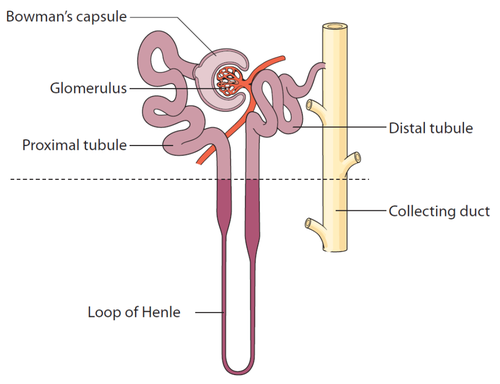What healthy kidneys do
To understand what happens in CKD, it is helpful to know what healthy kidneys do. They clean blood – waste products and extra water and salt are removed from the body in urine. They also make hormones, chemicals that are carried in the blood to send messages to other parts of the body, which help with other body functions.
This allows the kidneys to:
- remove waste products that are no longer needed or that may be harmful
- balance the levels of water, salt and minerals, which are needed for good health
- ensure the pH balance (or acid–base balance) stays the same
- control blood pressure, the force that helps blood flow round the body
- help keep bones and teeth healthy
- help make red blood cells, living parts of blood that carry oxygen round the body.
Remove waste and control the amount of water and chemicals
Kidneys remove waste products and some water and chemicals from the blood into urine (wee). This allows the body to have the right balance of water, acid and important minerals, including sodium (salt), potassium, calcium and phosphate. These minerals are in the foods that we eat.
The kidneys also make sure the body keeps blood cells and proteins in the blood.
Read more about how the kidneys make urine
Inside each kidney there are about a million nephrons. These tiny units make urine by removing some water, chemicals and waste products from the blood. The urine is collected in the kidney before it leaves through the ureters into the bladder. Each nephron is made up of a glomerulus (when we talk about more than one glomerulus, we say glomeruli) and renal tubule.

- Each glomerulus acts like a sieve, helping to remove extra water and waste from the body, and holding on to blood cells and protein, which the body needs.
- Blood flows into the kidneys and to each glomerulus.
- Most of the water and some other substances in the blood pass through the glomeruli.
- This liquid flows into the renal tubule. Most of this liquid moves back into the bloodstream. The rest of it becomes urine.
- The urine leaves the kidney by the ureters and goes into the bladder, where it is stored until we are ready to go to the toilet.
When kidneys are not working properly, they are less able to make the correct amount of urine. This can lead to one of two situations.
- Some children with CKD are unable to make concentrated urine. This means they pass a large amount of weak urine (almost all water with little other substances, such as wastes and salts). They often need to drink more water than usual to make up for the water they are losing in their urine.
- Other children with CKD are unable to make much urine at all. This means they pass only a small amount of urine, which may be very concentrated (less water with lots of other substances). They often need to drink less water than usual, to avoid water building up in their body (fluid overload).
In either case, the kidneys are less able to remove the right amount of some important chemicals. These include sodium (salt), phosphate and potassium. Your child may need to change his or her diet and/or take some supplements to help get the right balance of these chemicals.
Control blood pressure
Blood pressure is the force that helps blood flow round the body. Kidneys regulate (control) blood pressure in two ways:
- controlling the amount of salt that is in the blood, by removing some of it in urine
- making a hormone called renin, which affects how much of a chemical called angiotensin II is made, which can make blood vessels narrower and increase blood pressure
When kidneys are not working properly, they are less able to regulate blood pressure. At later stages of CKD, children may have high blood pressure (hypertension). Children may need to eat foods with less salt and take medicines to help control their blood pressure.
Keep bones and teeth healthy
Vitamin D, which we get from sunlight on the skin and from some foods (such as oily fish, eggs and breakfast cereal with added vitamin D), helps keep bones and teeth strong and healthy. The kidneys turn the vitamin D from sunlight and food into an active form that the body can use.
When kidneys are not working properly, there is less active vitamin D and too much of the mineral phosphate. The bones become less strong, and children may feel pain in their bones or joints – this is called renal bone disease (renal osteodystrophy)
Help produce red blood cells
Red blood cells are one type of living cell in the blood, which carry oxygen round the body. The body needs to keep making new red blood cells because they die after some time. Kidneys make a chemical called erythropoietin which helps make new red blood cells.
When kidneys are not working properly, the body may not have enough new red blood cells. This can lead to a condition called anaemia – children may feel tired and weak, and look paler than usual. Treatment includes medicines and blood transfusions.
Causes of CKD
CKD is very rare in children. It is much more common in older adults, especially with other illnesses. In children, CKD is caused by different conditions that affect the kidneys. Some of these are present at birth, and others start later in childhood.
Your child may need further tests to find out what has caused CKD. Your doctor will give you more information.
Only some kidney conditions cause CKD, and only some children with CKD progress to later stages.